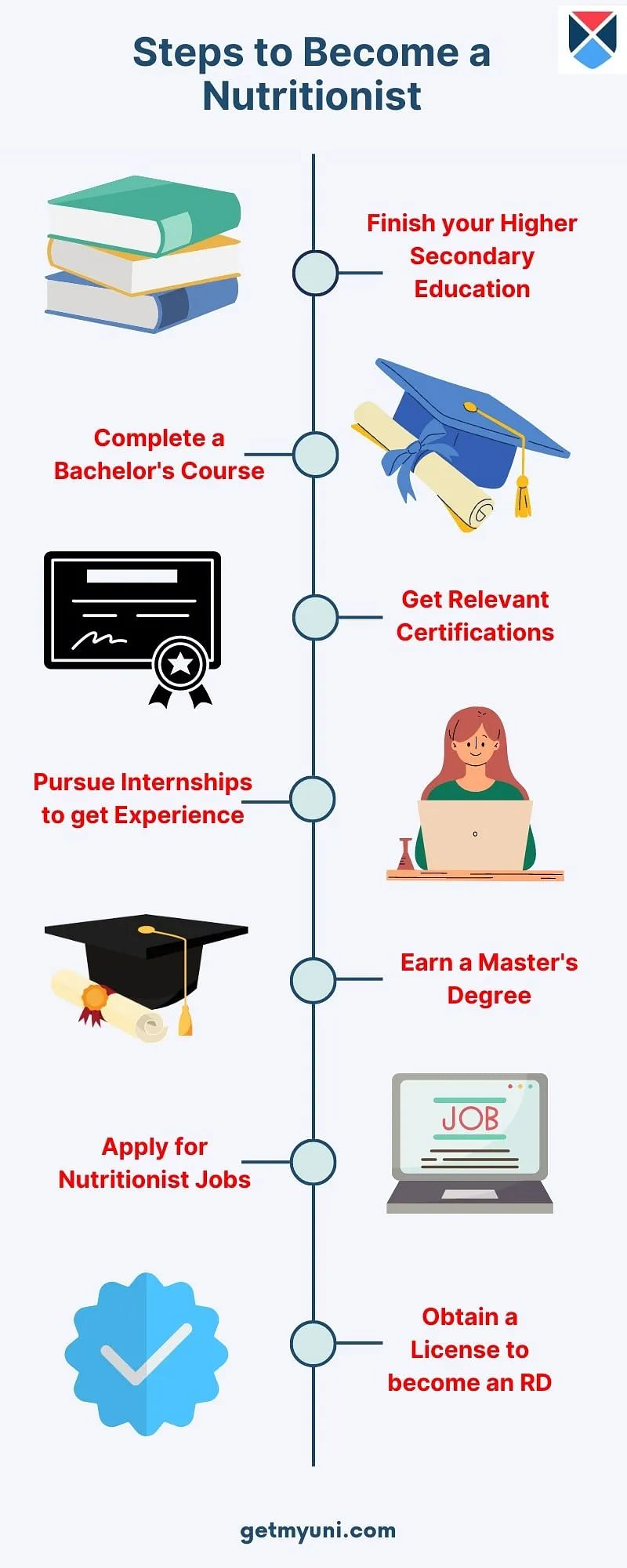Is being a Nutritionist your dream career option? Check out the complete step by step process on how to become a Nutritionist, Eligibility, Exams, Skills Required and Salary in 2023.
A nutritionist is a healthcare professional who helps individuals maintain a healthy lifestyle by advising them on the right food choices. Nutritionists consider the patient’s health goals, evaluate their health conditions, and accordingly provide a meal plan. In recent times, people have become more health conscious and understand the importance of maintaining a healthy lifestyle. This has increased the demand for nutritionists and the number of job opportunities in this field.
Opting for a career as a nutritionist requires aspirants to fulfil the academic requirements, like completion of 12th with Physics, Biology, and Chemistry. They should then earn a bachelor’s degree in nutrition or food science. Moreover, it is possible to get nutritionist jobs in India after graduation. However, completing a master’s degree in nutrition along with pursuing suitable internships & certifications will open up better opportunities for aspirants. On average, the nutritionist salary in India is INR 3,07,226 per annum.
Table of Contents
- How to Become a Nutritionist in India?
- Who is a Nutritionist?
- How Many Years to Become a Nutritionist?
- What does a Nutritionist do?
- Types of Nutritionists
- Eligibility to Become a Nutritionist
- Skills Needed to Become a Nutritionist
- Top Nutrition Colleges in India
- Nutritionist Jobs In India
- What is the Salary of a Nutritionist in India?
- Top Companies Recruiting Nutritionists in India
- Top Employment Sectors for Nutritionists
- Pros and Cons of Being a Nutritionist
How to Become a Nutritionist in India?
To help students get started with their nutritionist career, we have given the step-wise process to become a nutritionist.
- Step 1: Fulfil Educational Requirements
- Step 2: Get Certified
- Step 3: Gain Hands-on Experience
- Step 4: Earn a Master’s Degree
- Step 5: Begin the Job Hunt
- Step 6: Obtain a License
Step 1: Fulfil Educational Requirements
First and foremost, an aspirant must complete grade 12th with Physics, Chemistry, & Biology as the major subjects. After completing 10+2, they must clear an entrance exam for nutritionists like NPAT, BITSAT, CUET, SET, MHT CET, or NEET. Top nutritionist colleges in India accept students for various nutritionist degree programs through valid test scores.
Candidates should proceed with pursuing a bachelor’s course in fields like food science or food and nutrition. B.Sc in Nutrition and Dietetics is one of the most popular undergraduate courses to become a nutritionist. Check out the list of top nutrition courses that aspirants can opt for at the undergraduate level.
|
Course |
Duration (in years) |
Average Annual Fee (INR) |
|
B.Sc in Nutrition & Dietetics |
3 |
INR 40,000-INR 2,50,000 |
|
BSc in Clinical Nutrition and Dietetics |
3 |
INR 30,000-INR 5,00,000 |
|
BSc in Food Science and Nutrition |
3 |
INR 60,000-INR 2,00,000 |
|
BTech Food Technology |
3 |
INR 30,000-INR 3,00,000 |
|
BSc in Physiology |
3 |
INR 20,000-INR 3,00,000 |
Other than the programs given above, aspiring nutritionists can also pursue a diploma program in Nutrition and Dietetics, Nutrition and Diet Planning, Health education, etc.
Step 2: Get Certified
Now we will discuss how to become a certified nutritionist. Aspirants can pursue any of the certified nutritionist courses, as many companies give preference to certified nutritionists. Thus, earning relevant certifications will not only help candidates develop their expertise but also increase their possibilities of getting recruited.
The following are the top certification courses that a nutritionist can consider pursuing:
- NASM Certified Nutrition Coach Certification
- ISSA Nutritionist Certification
- AFPA Master-Level Nutrition Consultant Certification
- AFPA Nutrition and Wellness Consultant Certification
- NCSF Sport Nutrition Specialist Certification
- Precision Nutrition Certification Level 1
- IGNOU Certification Courses
- Certificate in Food and Nutrition
- Certificate in Nutrition and Child Care
Step 3: Gain Hands-on Experience
After completing nutritionist qualifications and qualifications, it is time to apply all that is learned. Pursuing internships is the best way to get real-world experience and build expertise. Here are some ways through which candidates can gain hands-on experience as a nutritionist:
- Internships: Through an internship, candidates will clearly understand the industry expectations in the field of nutrition. They will learn a lot about different aspects- from preparing patient care plans to managing food delivery for the clients.
- Freelance nutrition work: Another option is to provide freelance services as a nutritionist. Candidates can give guidance on a case-by-case basis to secure better income. Volunteering with non-profit organisations is also a good option to get experience.
- National dietetic or nutritionist organisations: Candidates can join various organisations related to the field and take part in events and meetings to gain more knowledge and experience
Step 4: Earn a Master’s Degree
Opting for a master’s program in nutrition is optional. However, students can specialise in specific nutrition fields and improve their career opportunities by going for higher nutritionist education. Here are the top master’s degree courses to become a nutritionist.
|
Course Name |
Nutritionist Course Duration (in years) |
Nutritionist Course Fees (INR) |
|
M.Sc. Nutrition and Dietetics |
2 |
INR 40,000-INR 1,00,000 |
|
M.Sc. Clinical Nutrition |
2 |
INR 30,000-INR 2,00,000 |
|
M.Sc. Food Science |
2 |
INR 20,000-INR 1,00,000 |
|
M.A. in Dietetics Studies |
2 |
INR 30,000-INR 2,00,000 |
|
M.A. in Food Technology |
2 |
INR 40,000-INR 1,00,000 |
It is also possible for candidates to pursue a 1-year PG diploma in nutrition and dietetics to be a nutritionist.
Step 5: Begin the Job Hunt
Candidates might be wondering how to get a job as a nutritionist. Candidates must first create an impressive resume and specify their qualifications, experience, and skills clearly. Then they must check out online job portals for employment opportunities. There are plenty of job opportunities available for nutritionists both in the private and public sectors.
Step 6: Obtain a License
Students must have now understood how to be a nutritionist. However, the next step they can take to advance their career as a nutritionist is to become a registered dietitian. Nutritionists can register with the Indian Dietician Association (IDA) to work as registered dietitians in healthcare facilities. Those who possess a bachelor’s degree with at least 6 months of internship experience are eligible to apply.
Who is a Nutritionist?
Nutritionists counsel patients on food and nutrition matters and assist them in adopting healthy eating habits. They understand the health requirements of patients, educate them about healthy food options, and curate personalised nutrition plans. A candidate aspiring to be a nutritionist must possess nutrition knowledge with strong analytical and problem-solving skills.
How Many Years to Become a Nutritionist?
It can take around 5-6 years for an aspirant to become a certified nutritionist. The time taken also depends on the program that the candidate has opted for. It can be a certification program or an advanced degree.
While a bachelor’s degree in nutrition will be completed in 3 years, a master’s degree will take 2 years to complete. Moreover, the knowledge and experience of candidates play a huge role in determining the time taken for them to become a nutritionist.
What does a Nutritionist do?
The daily duties of a nutritionist vary from assessing a patient’s health conditions to creating diet charts. Nutritionists may also work closely with licensed healthcare professionals in several medical settings. Here are the major nutritionist roles and responsibilities for the reference of the aspirants.
- Interacting with patients to find out their goals in terms of health and wellness
- Evaluating the health status of patients
- Counselling patients on food and nutrition matters
- Developing customised diet plans based on the client’s budget and preferences
- Tracking the progress of clients
- Attending various meetings with the management to discuss patient care and the latest advancements in the field.
Types of Nutritionists
There are different types of nutritionists in India based on their specialisation. We have provided a brief overview of each of them:
1. Clinical Nutritionist
Clinical nutritionists work in clinics or hospitals. Essentially, they work with healthcare providers to develop meal plans for patients.
2. Gerontological Nutritionist
Gerontological Nutritionists look into elderly nutrition care. They work in nursing homes/hospitals with other healthcare professionals.
3. Sports Nutritionist
They provide meal plans for sportspersons and athletes. Universities, sports leagues, or sporting clubs are some organisations where sports nutritionists work.
4. Veterinary Nutritionist
Veterinary nutritionists take care of the well-being of animals. They mostly work with veterinary hospitals, wildlife reserves, pet food organisations, or zoos.
5. Corporate Nutritionist
The role of corporate nutritionists is to develop cost-effective meal plans for organisations. Such nutritionists are employed by large corporations that have in-house cafeterias.
Eligibility to Become a Nutritionist
An aspirant must meet the eligibility for a nutritionist in order to pursue a career in this field. Here we have discussed the nutritionist course eligibility criteria, along with other prerequisites.
- A candidate must opt for subjects like Physics, Chemistry, and Biology in class 12.
- To pursue a bachelor’s course in nutrition, completion of class 12 from the science stream is compulsory.
- Some universities admit candidates based on entrance test scores. Therefore, aspirants must crack exams like NPAT, BITSAT, CUET, SET, MHT CET, or JEE.
- To pursue a master’s program in nutrition, a candidate should have a bachelor’s degree in the relevant field.
Skills Needed to Become a Nutritionist
Here are the top skills of nutritionists that an aspiring candidate must have to excel in this field.
- Nutrition Knowledge
- Dietary Assessment
- Meal Planning
- Nutrition Counselling
- Research skills
- Communication skills
- Problem-solving skills
- Critical thinking
- Professional ethics
- Planning Skills
- Persuasion Skills
- Interpersonal Skills
- Decision-Making Skills
- Ability to Listen
Top Nutrition Colleges in India
There are several colleges in India that offer nutrition courses at undergraduate and postgraduate levels. Check out the list of the top UGC-approved nutrition colleges below:
- Ethiraj College for Women
- Women’s Christian College (WCC)
- Queen Mary’s College
- St. Ann’s College for Women
- Justice Basheer Ahmad Sayeed College
- Manipal Academy of Higher Education
- SRM Institute of Science and Technology
- MG University, Kottayam
- Mahatma Gandhi Medical College and Research Institute
Nutritionist Jobs in India
In the past few years, the health and wellness industry has witnessed rapid growth. Also, there is an increased awareness of healthier living among the people. Therefore, there are multiple job opportunities for a nutritionist. Following are the major career options that nutritionists can opt for:
- Health and Nutrition Counselor
- Physical Therapist
- Nutrition Teacher
- Agriculture and Food Science technician
- Medical Sales Representative
- Researcher
- Consultant
- Clinical Dietician
- Animal Nutritionist
- Registered Dietician
Government jobs for Nutritionist
Not just the private sector but the government sector also offers ample opportunities for nutritionists. Here is the list of some government nutritionist jobs available in India, along with the names of the respective organisations.
|
Job Profile |
Organisation Name |
|
Project Junior Medical Officer |
National Institute of Nutrition, Hyderabad |
|
Nutritionist/Dietician |
Ministry of Health and Family Welfare |
|
District Nutrition Officer |
Integrated Child Development Services (ICDS) |
|
Assistant Dietician |
Tata Memorial Centre |
|
Research Officer |
Indian Council of Agricultural Research (ICAR) |
What is the Salary of a Nutritionist in India?
The nutritionist's salary in India is approximately INR 3,07,226 per year. Depending on the experience and designation of a nutritionist, there will be a change in the salary amount. Know the experience-wise nutritionist salary details here:
|
Level |
Experience |
Average Annual Salary (INR) |
|
Entry-Level Nutritionist |
Less than 1 year |
INR 2,57,605 |
|
Early Career Nutritionist |
1-4 years |
INR 2,97,242 |
|
Mid-Career Nutritionist |
5-9 years |
INR 4,21,907 |
|
Experienced Nutritionist |
10-19 years |
INR 4,79,732 |
Based on their designation, nutritionists can earn the following salary figures:
|
Job Profile |
Average Annual Salary (INR) |
|
Clinical Nutritionist |
INR 3,50,000 |
|
Public Health Nutritionist |
INR 4,50,000 |
|
Sports Nutritionist |
INR 4,50,000 |
|
Holistic Nutritionist |
INR 3,60,000 |
|
Geriatric Nutritionist |
INR 3,00,000 |
|
Nutrition Manager |
INR 5,11,000 |
|
Animal Nutritionist |
INR 2,80,000 |
Top Companies Recruiting Nutritionists in India
Candidates looking for nutritionist career opportunities must check below the list of top companies that hire nutritionists in India:
- Accor Hospitality
- Hyatt Corporation
- Vatika Group
- Le Meridien
- Taj Group of Hotels
- FSSAI
- IIFPT
- CSIR
- Apollo Groups
- VLCC Healthcare
- Fortis Healthcare
- Dr Batra’s
- Gold Gym
- Cultfit
- Fitness First
- Kokilaben Dirubhai Ambani Hospital
- Talwalkars Better Value Fitness Limited
- AIIMS
- HCL Healthcare
- Oliva Skin
Top Employment Sectors for Nutritionists
Mentioned below are the major sectors or organisations where candidates can take up jobs as a nutritionist:
- Hospitals (Government and Private)
- Multinational Corporations (MNCs)
- Research and Advocacy
- Private Clinics
- Nursing Homes
- Community Health Programmes
- Health Product Companies
- Diabetic Clinics
- Wellness Startups
- Home Health Care Agencies
- Wellness Centers
- Fitness Clubs
- Gyms and Aerobic centres
Pros and Cons of Being a Nutritionist
Though there are a number of benefits to pursuing a career as a nutritionist, candidates must note that there are a few challenges as well. Check out the pros and cons of becoming a nutritionist below.
Pros of Being a Nutritionist
Here is why candidates should build a career in the field of nutrition:
- Increase in demand: People are giving more importance to health and nutrition in recent times. Therefore, the demand for nutritionists is on the rise, and there is broad scope in this field.
- High Job Satisfaction: A nutritionist works on improving the health and overall being people of individuals, which gives a sense of satisfaction.
- Diverse career opportunities: Nutritionists have the option to work in various settings or even take up a private practice. Thus, they get to explore their area of interest and decide on a niche accordingly.
- Flexibility at Work: As nutritionists can also work independently, they have the freedom to set their own schedules. This results in better work-life balance.
- Global relevance: There is a demand for skilled nutritionists on a global level. Nutritionists can also find many opportunities to work worldwide.
Cons of Being a Nutritionist
The following points indicate the challenges that a candidate might face as a nutritionist:
- Stressful job: Working with people and looking into requirements on a regular basis can sometimes be stressful for nutritionists.
- Unclear job title: Anyone who has a relevant degree, like a PG diploma or certification in nutrition, can call themselves a nutritionist. However, some organisations require additional credentials to hire individuals as nutritionists.
- Time and Investment: A lot of time and money goes into acquiring specialised knowledge in the field of nutrition.
- Knowledge: To become successful in this field, candidates need to keep updating their knowledge from time to time.
















POST YOUR COMMENT